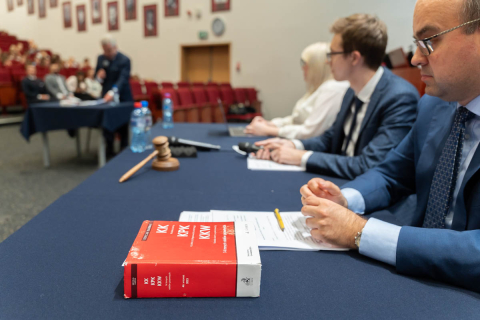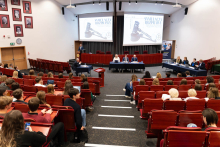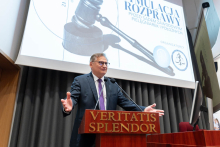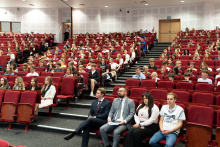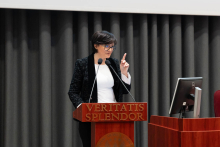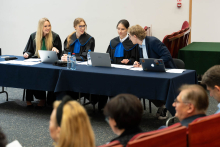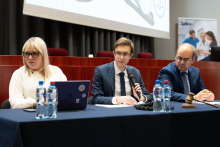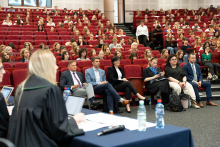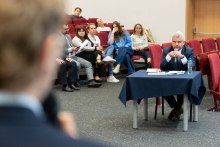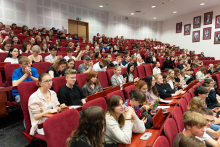“Medical professions are among those whose core mission is to protect human life and health. A mistake in this field can pose a serious risk to both,” emphasized Dr. Anna Augustynowicz, Head of the Department of Health Economics and Medical Law. “With this responsibility also comes legal accountability. Medical professionals can be held criminally, civilly, professionally, and administratively liable.”
The simulation demonstrated what legal responsibility might look like in practice. Notably, the event involved professionals. The simulation was supervised by Judge Łukasz Malinowski of the Warsaw Regional Court. The role of the Professional Disciplinary Spokesperson, who sought a penalty for the accused, was played by attorney Paweł Strzelecki. The trial was held before a simulated Regional Court of Nurses and Midwives of the Regional Chamber of Nurses and Midwives.
What happened
In one of the psychiatric hospitals, a charge nurse allowed a patient with bipolar disorder to leave the ward unaccompanied, contrary to the physician’s written orders in the patient’s chart. The patient not only left the ward but exited the hospital entirely and, a few hours later, threw himself in front of a train.
The Patient Ombudsman for the Psychiatric Hospital reported the incident to the Professional Disciplinary Spokesperson for Nurses and Midwives of the Regional Chamber, who initiated a disciplinary investigation.
The accused defends himself
Once the court confirmed that all summoned parties were present, the Professional Disciplinary Spokesperson submitted a motion to impose a penalty.
“I request disciplinary action against the nurse for, on November 5, 2024, while serving as the charge nurse in the Second Psychiatric Ward of the Independent Public Healthcare Institution for Mental Health, permitting a patient to leave the ward and hospital premises unsupervised. This was in direct violation of a physician’s order requiring the patient to be accompanied when outside the ward, and contrary to hospital policy regarding patient movement. The accused thereby breached Article 2(3) of the Code of Professional Ethics for Nurses and Midwives of the Republic of Poland and Article 11(1) of the Act on the Professions of Nurse and Midwife.”
The nurse, portrayed skillfully by Grzegorz Pesta, a nursing student, defended himself by stating that the patient had recently been granted leave from the facility and returned without incident. He claimed it was not the first time the patient had gone out alone, and a customary practice existed on the ward permitting such outings for stable patients, even against chart notations. He also pointed to staff shortages and personal exhaustion as contributing factors.
After delivering his statement, the accused faced a rigorous cross-examination by the Professional Disciplinary Spokesperson, who aimed to prove negligence. The accused also replied to questions from his defense attorneys, who sought to highlight his professionalism, long-standing experience, and unblemished work record.
Witness testimonies and closing statements
The court heard from several witnesses. One was a nurse who had also been on duty the day of the incident. He was present during the conversation in which the accused gave the patient permission to leave the ward. He also described realizing the patient was missing and promptly informing his superior – the accused.
Another witness was the hospital’s head physician, who confirmed the patient’s absence and immediately initiated the proper procedures. The head physician explained his efforts to address staffing shortages and clearly stated that, in his view, the accused had seriously violated not only the ward’s rules but also those of the hospital.
A third witness was a nurse who had also been present on the ward that day. However, her recollections were vague, and her testimony elicited bursts of laughter from the audience.
“Your Honor, I don’t remember what I had for breakfast yesterday, let alone what happened six months ago. I have a good memory, but it’s short and fleeting,” she said.
Another quote from the nurse:
“My morning routine is coffee first. I know for sure I did that. Then I took care of the patients. That I also know. How did I do it? Properly. According to current medical knowledge. What happened and at what time? I don’t remember.”
Her humorous remarks were met with thunderous applause, prompting the court to ask the audience to remain quiet.
The final witness was a hospital security guard, whom the defense tried to implicate for allowing the patient to leave the facility. However, he defended himself by explaining that many visitors look like patients, making them indistinguishable, and that he was not authorized to check the IDs of those leaving the premises.
In closing, the Professional Disciplinary Spokesperson maintained that the evidence clearly indicated the nurse had failed to ensure patient safety and requested a formal reprimand. The defense, on the other hand, argued that the issue was systemic rather than individual, citing management’s tolerance of informal “customary rules” and failure to address chronic staff shortages.
Awaiting the verdict
As the court deliberated, Dr. Anna Augustynowicz explained the range of sanctions available to the Court of Nurses and Midwives.
“The Nurses and Midwives Court may impose the following penalties: a warning, a reprimand, a fine ranging from PLN 1,000 to 10,000 for social purposes, a ban on holding managerial positions in healthcare entities for 1–5 years, a ban on serving in elected positions within professional self-governing bodies for 1–5 years, a restriction on the scope of professional duties for 6 months to 2 years, suspension of the right to practice for 1–5 years, or the most severe – revocation of the right to practice.”
What was the verdict? The court found the nurse guilty of the charges as specified in the motion for penalty and, pursuant to Article 60(1)(2) of the Act of November 15, 2011, on the Professions of Nurse and Midwife, imposed a formal reprimand.
Event organizers
The simulation was prepared by the Department of Health Economics and Medical Law, part of the Chair of Public and Environmental Health, in collaboration with students from the Medical Law Student Scientific Club and the Mental Health Protection Student Scientific Club, the latter under the academic supervision of Dr. Katarzyna Syroka-Marczewska.
The event, held on May 21, 2025, attracted significant interest. Participants included Dr. Łukasz Czyżewski, Vice-Dean for Nursing, Faculty of Health Sciences; Dr. Filip Raciborski, Vice-Dean for Public Health at the Faculty of Health Sciences; Prof. Bolesław Samoliński, Head of the Chair of Public and Environmental Health; and Prof. Barbara Piekarska, PhD (Eng.) from the Department of the Prevention of Environmental Hazards, Allergology, and Immunology.
Most attendees were students from the Faculty of Health Sciences, as well as students from Władysław IV High School in Warsaw, Tomasz Zan High School in Pruszków, and Bednarska Primary School in Warsaw.
